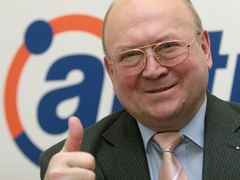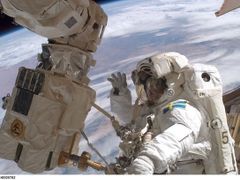Prague - It has been 30 years since Vladimír Remek, a citizen of what was then communist Czechoslovakia, became the first non-Soviet and non-American man in space.
Now, the question is - is there any hope that another Czech astronaut would go to space in the forseeable future?
"Certainly we will have another astronaut, it's just a question of time," assured Jan Kolář, a professor at the Faculty of Science, Charles University in Prague and the director of the Czech Space Office, which coordinates Czechs´ participation in space flight related international projects.
"But it won't happen sooner than in four or five years," Professor Kolář adds though.
European space family
It all depends whether the Czech Republic enters the European Space Agency (ESA) that has its own division of astronauts participating in Russian and American space flights.
Currently, there are eight active members of the group - two from France and Italy, one from Germany, Belgium, Sweden and Netherlands.
However, it's only half of the planned number, since the rest have left in recent years.
"This year, the ESA is recruiting new astronauts. There won't be any Czechs among them though because our country won't be a member state yet," explained professor Kolář.
Will the industry be interested?
The Czech Republic is currently cooperating with ESA and serious discussions on Czech membership has taken place since last summer.
The country is said to enter the organization at the beginning of next year. By then, the astronaut recruitment by ESA will have been closed though.
"Next round of recruitments will take place in four or five years," informed Kolář.
Antonín Vítek from the Czech Academy of Sciences agrees that a selection of Czech astronaut is not the priority now. Vítek sees some possible complications hampering the Czech admission to the ESA.
"Candidate countries are to prove they are able to contribute to scientific progress not only with research, but also by producing machinery and other equipment for space flights. There is a question, though, whether Czech industry will be interested and able to supply adequate accessories," explained Vítek.
More Europeans in space soon
Vítek is sure the Czech Republic will eventually become an ESA member state.
European astronauts usually have missions at the International Space Station (ISS). In February, Atlantis shuttle has successfully brought there a European laboratory called Columbus and attached it to the station.
"We can expect more Europeans going there to perform scientific experiments," informed Kolář. The laboratory is expected to serve ten years at least.
Thus a Czech astronaut or researcher will sooner or later surely get a chance to use it.
European spaceship? A fantastic idea so far
The ESA plans to set a permanent robotic base on the moon in the next decade, and later even a facility made for human presence.
However, the organization by itself is not able to send its own astronauts to space.
Although it plans to launch an automatically controlled cargo shuttle in the following weeks, the prospects of European space flight with humans on board is still somewhat vague.
So far, there are only three states capable of sending people to space - Russia, China, and the USA.

